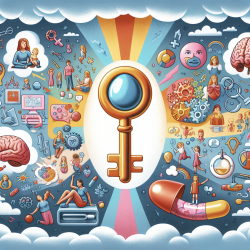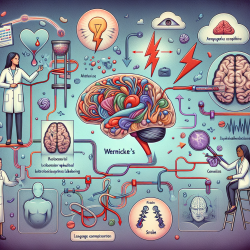Introduction
In the realm of speech-language pathology, understanding the intricate workings of the brain is crucial for fostering optimal outcomes in children. A recent study titled "Brain activity during a post-stress working memory task differs between the hormone-present and hormone-absent phase of hormonal contraception" sheds light on the nuanced effects of hormonal contraception on stress responses and cognitive performance. This research provides valuable insights that can be leveraged to enhance therapeutic strategies for children, particularly in stress management and cognitive function.
Key Findings from the Study
The study explored how hormonal contraceptives (HCs) affect brain activity during working memory tasks under stress. Key findings include:
- Women exhibited greater disengagement of the default mode network during the hormone-present phase, aligning with typical working memory-related brain activation patterns.
- The free cortisol response to stress remained consistent across the hormonal cycle, yet cognitive performance and brain activation differed.
- Increased cortisol levels were associated with better working memory performance during the hormone-present phase, suggesting a protective effect of synthetic hormones against stress-induced cognitive disruptions.
Implications for Practitioners
For speech-language pathologists and educators, these findings underscore the importance of considering hormonal influences when designing interventions for children. Here are some actionable steps practitioners can take:
- Incorporate Stress Management Techniques: Understanding that hormonal phases can modulate stress responses, practitioners can integrate stress-reduction strategies, such as mindfulness and relaxation exercises, into therapy sessions to enhance cognitive performance.
- Personalize Interventions: Recognize that individual differences in hormonal cycles may affect children's stress responses and cognitive abilities. Tailor interventions to accommodate these variations, ensuring more personalized and effective therapy.
- Encourage Further Research: Practitioners should advocate for and participate in research that explores hormonal influences on cognition in children. This will help build a more comprehensive understanding of how to optimize therapeutic outcomes.
Encouraging Further Exploration
The study's findings open the door for further exploration into how hormonal cycles influence stress and cognition in children. Practitioners are encouraged to delve deeper into this area, potentially collaborating with researchers to expand the knowledge base and improve therapeutic practices.
Conclusion
By integrating insights from hormonal research into therapeutic practices, speech-language pathologists can enhance the cognitive and emotional well-being of children. Understanding the complex interplay between hormones, stress, and cognition allows for more informed, data-driven decisions that lead to better outcomes.
To read the original research paper, please follow this link: Brain activity during a post-stress working memory task differs between the hormone-present and hormone-absent phase of hormonal contraception.










